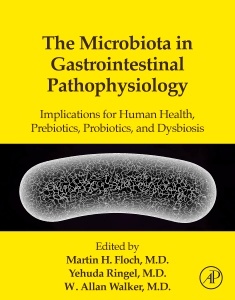The Microbiota in Gastrointestinal Pathophysiology Implications for Human Health, Prebiotics, Probiotics, and Dysbiosis
Coordonnateurs : Floch Martin H., Ringel Yehuda, Walker W. Allen

The Microbiota in Gastrointestinal Pathophysiology: Implications for Human Health, Prebiotics, Probiotics and Dysbiosis is a one-stop reference on the state-of-the-art research on gut microbial ecology in relation to human disease. This important resource starts with an overview of the normal microbiota of the gastrointestinal tract, including the esophagus, stomach, Ileum, and colon.
The book then identifies what a healthy vs. unhealthy microbial community looks like, including methods of identification. Also included is insight into which features and contributions the microbiota make that are essential and useful to host physiology, as is information on how to promote appropriate mutualisms and prevent undesirable dysbioses. Through the power of synthesizing what is known by experienced researchers in the field, current gaps are closed, raising understanding of the role of the microbiome and allowing for further research.
2. Characterizing and Functionally Defining the Gut Microbiota: Methodology and Implications
3. The Microbiota of the Gastrointestinal Tract in Infancy
4. The Methods of Identification of the Microbiota In aged
5. Escherichia coli Nissle 1917
6. Probiotics of the Acidophilus Group: Lactobacillus acidophilus, delbrueckii subsp bulgaricus and johnsonii
7. Lactobacillus rhamnosus, strain GG
8. Lactobacillus reuteri
9. Lactobacillus casei & Lactobacillus paracasei
10. The beneficial influences of Lactobacillus plantarum on human health and disease
11. Use of the Bacillus in Human Intestinal Probiotic Applications
12. Bifidobacteria as Probiotic Organisms: An Introduction
13. Bifidobacterium animalis spp. lactis
14. Bifidobacterium bifidum
15. Bifidobacterium breve
16. Bifidobacterium longum
17. Bifidobacterium longum spp. infantis
18. Saccharomyces boulardii
19. Streptococcus thermophilus [Streptococcus salivarius subsp thermophilus]
20. Complexities and Pitfalls in the Production of Multi-Species Probiotics: The Paradigmatic Case of VSL#3 Formulation and Visbiome
21. The Viruses of the Gut Microbiota
22. Dietary fiber, Soluble and Insoluble, Carbohydrates, Fructose and Lipids
23. Prebiotics, Inulin, and other Oligosaccharides
24. The Benefits of Yogurt, Cultures and Fermentation
25. Dysbiosis
26. Immunologic Response in the Host
27. Gastrointestinal Microbiota and the Nural System
28. Effect on the Host Metabolism
29. Relationship Between Gut Microbiota, Energy Metabolism and Obesity
30. Taxonomic and Metagenomic Alterations of Microbiota in Bariatric Surgery
31. The Influence of Microbiota on Mechanisms of Bariatric Surgery
32. Allergic and Immunologic Disorders
33. Probiotics Use in Infectious Disease (Respiratory, Diarrhea and Antibiotic-Associated Diarrhea)
34. The Use of FMT in Clostridia difficile and Potential Uses
35. Probiotics in the Treatment of Pouchitis
36. Probiotic Treatment in Crohn’s Disease
37 Treatment of Inflammatory Bowel Disease in Ulcerative Colitis
38. Treatment of Functional Bowel Disorders with Prebiotics and Probiotics
39. Celiac Disease, the Microbiome and Probiotics
40. Probiotics for the Treatment of Liver Disease
41. The Prevention and Treatment of Radiation and Chemotherapy Induced Intestinal Mucositis
42. The Role of the Brain-Gut-Microbiome in Mental Health and Mental Disorders
43. Probiotics in Bacterial Vaginosis
Dr. Floch is renowned for his work in gastric and intestinal diseases and probiotics. He lectures nationally and internationally, haven given Grand Rounds at Harvard, Brown, UMass, and UConn among others. He is a consultant to Pfizer, Proctor & Gamble, Dannon, Shire and Biocodex.
His research has been extensive in gastroenterology having had grants from the Armed Forces and National Institute of Health.
Dr. Floch has a FWCI of 1.18 and has the majority (76%) of his content published in gastroenterology journals. 8.7% of his work appears in the top 10% most cited journals worldwide.
Dr. Floch has experience with national, international, institutional and single authorship.
Dr. Ringel has been involved in clinical and translational research related to functional gastrointestinal disorders for over 15 years. His research relates to the effect of clinical, physiological and psychosocial factors on the intestinal physiology and functional gastrointestinal symptoms. He is an expert in clinical research and has been involved in the design, evaluation and conduct of clinical trials evaluating new drugs, dietary and food supplements, and new approaches for diagnosis and treatment of patients with GI disorders. He was awarded two grants from the National Institute of Health (NIDDK)
- Explains how to modify the gut microbiota and how the current strategies used to do this produce their effects
- Explores the gut microbiota as a therapeutic target
- Provides the synthesis of existing data from both mainstream and non-mainstream sources through experienced researchers in the field
- Serves as a ‘one-stop’ shop for a topic that’s currently spread across a number of various journals
Date de parution : 12-2016
Ouvrage de 442 p.
21.4x27.6 cm
Thèmes de The Microbiota in Gastrointestinal Pathophysiology :
Mots-clés :
1206 and 1207; 16S rRNA gene; acidophilus; adults; adverse events; aging; allergy; antibiotic-associated diarrhea; antiinflammatory; asthma; atopy; autism; B; longum 1714; B; longum bb536; B; longum es 1; B; longum KACC 91563; B; longum NCC 3001; B; longum spp; longum SPM 1205; B; longum subsp; infantis ATCC 15697; B; longum w11; B632; Bacillus; bacteria; bacterial colonization; bacterial translocation; bacterial vaginosis; bacteriocin; bariatric surgery; Barrett's esophagus; BB536; BbVK3; BGN4 and PRL 2010; Bifidobacterium; Bifidobacterium animalis; Bifidobacterium animalis spp; lactis BB-12; Bifidobacterium animalis spp; lactis DN-173 010; Bifidobacterium bifidum; Bifidobacterium bifidum strains BB-06; Bifidobacterium breve strains BBG-001; Bifidobacterium longum spp; infantis 35624; biosimilar; BR-03; brain; bulgaricus; C-50 and Yakult; cancer; casei; CDAI; CDI; CECT 7347; celiac disease; central nervous system; cheese; children; chronic diseases; clinical trials; Clostridium difficile; Clostridium difficile infection; CNCM I-4035; colon cancer; colon transit; constipation; Crohn's disease; CTLA-4; cytosine; dairy; dendritic cells; diarrhea; diet; dietary fiber; diverticulitis; dysbiosis; elderly microbiome; endospore; energy harvest; energy metabolism; enteric nervous system; epithelium; Escherichia coli Nissle 1917; esophagus; fecal microbial transplant; fecal microbiota transplant; fermentable substrates; fermentation; fermented food; FMT; formulations; fructan; fructooligosaccharide; functional bowel disorders; FXR; G9-1; galactooligosaccharide; gastric bypass; gastroenteritis; gastrointestinal microbiota; genome; genus; ghrelin; gnotobiotics



